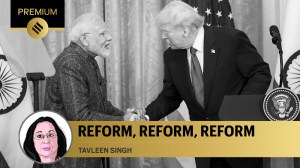BMC Budget: Plans for improving air quality in Mumbai
CM Eknath Shinde, earlier this week instructed the BMC administration to set up air-purifier towers in Mumbai.
 The BMC aims towards setting up air-purifying filters in five locations in Mumbai that records significant amount of carbon-footprint owing to heavy vehicular presence regular. (File)
The BMC aims towards setting up air-purifying filters in five locations in Mumbai that records significant amount of carbon-footprint owing to heavy vehicular presence regular. (File) With Mumbai continuously looming under poor air quality for more than three months now, the Brihanmumbai Municipal Corporation (BMC) as part of its Rs 52,619 crore budget for the financial year 2023-24 has announced a seven-step policy for mitigating air-pollution in the megapolis.
The civic body’s move comes after chief minister, Eknath Shinde, earlier this week instructed the BMC administration to set up air-purifier towers in Mumbai. Starting November 2022, till the first week of February, Mumbai has been experiencing ‘Poor’ to ‘Very Poor’ air-quality in most of the days.
In its civic budget this year, the BMC has coined the policy as Mumbai’s ‘Air Pollution Mitigation Action Plan’ (APMAP) and under this program, the civic body has aimed to curb air-pollution concentration level across various sectors, initiate multi-level monitoring strategy for the city as well as adapting a decentralize planning system for bringing out measures. The BMC in its budget has earmarked Rs 25 crore fund for this policy.
Sources in the BMC revealed that this is a last-minute addition in the budget that was incorporated after CM’s diktat regarding this matter.
The BMC has also announced setting up of dedicated air-quality monitoring units at the ward level.
The civic body has also said that it will install 14 air-purifier towers in Mumbai (Two towers each in the seven municipal zones of city). It is pertinent to note that similar smog towers have been installed by the authorities in several north Indian cities, Delhi, Gurugram, Lucknow and Chandigarh to curb air-pollution level. However municipal commissioner and state appointed administrator, Iqbal Singh Chahal said that the towers in Mumbai doesn’t resemble those of any other city.
Each tower will be 30-feet long and will have a capacity to purify the air within a one-kilometer radius. The approximate cost of each tower will be around Rs 3.5 crore. The towers will operate through radio waves and electromagnetic action
“These towers will be equipped to cut down the suspended pollutant materials in air by 45%. We are not following examples of other cities and have carried our own feasibility study through independent experts before taking the call for setting up these towers,” said Chahal on Saturday.
Besides this, the BMC also aims towards setting up air-purifying filters in five locations in Mumbai that records significant amount of carbon-footprint owing to heavy vehicular presence regular.
These locations are, Dahisar Toll Naka, Mulund Check Naka, Mankhurd, Kalanagar Junction and Haji Ali Junction. Chahal said that these purifiers will have a maximum range of 50 meters and will be initially set up as a pilot project.
During his budget speech, Chahal also acknowledged that the ongoing construction works for several real-estate and infrastructure projects in Mumbai is also a key contributing factor for the city’s poor air-quality. Chahal said that at present more than 3,500 real-estate projects are ongoing in Mumbai and the seven-step policy will also include guidelines that real-estate firms will need to implement at the construction sites.
“While infrastructure development is important for growth, at the same time we need to embrace sustainable development measures as well, since dust pollution is also becoming a matter of concern. During demolition and construction works dust particles remain suspended in the air and the open carriages of trucks also leads to air pollution during transportation of construction debris,” said Chahal.
“Therefore, we will be issuing guidelines to mitigate the dust particles at the construction site itself. All the trucks transporting debris should be covered entirely and their tires needs to be washed after they leave the spot.,” he said.
In his budget speech, Chahal also maintained that BMC is set to procure and deploy electric-powered sweeping machines for cleaning dust and loose gravels on roads along with sprinklers as well as vehicles mounted with mist discharge machines for cleaning the roads.
Chahal also said that by March 31, BMC is set to come up with a policy that would see ban in open garbage and debris burning.
Besides this, the civic body also aims to set up Continuous Ambient Air Quality Monitoring Stations (CAAQMS) which will be pollution monitoring units at the municipal ward level to determine the quality of air at an hyperlocal level. Chahal said that the idea behind setting up these units is to get an actual data of air quality in some of the areas in Mumbai that houses refineries.
The CAAQMS will jointly coordinate with the Maharashtra Pollution Control Board (MPCB) IIT-Bombay, National Clean Air Programe (NCAP) and National Environmental Engineering Research Institue (NEERI).
In last year’s financial budget, BMC had announced the Mumbai Climate Action Plan (MCAP) to tackle similar environment issues. This project was helmed by formed environment minister, Aaditya Thackeray. While in the budget document there is no mention of MCAP this year, however Chahal maintained that this policy is not being scrapped.
“We have procured 3,000 electric buses for BEST and have also floated policy towards incentivizing clean and green energy. All these proposals were part of MCAP. Even last year we announced the formation of a climate action cell, which is also underway and will be in action soon,” he said.
While citizens have appreciated the BMC’s approach towards coming up with a policy for tackling climate change, environment activists have also criticized BMC’s idea of installing smog tower.
“The BMC Administrator, as directed by the CM and DCM, has announced that the BMC will set up smog towers even though they have not worked anywhere. This is a complete waste of money that could have been better utilized for setting up a real time air monitoring network with real time alerts,” said Debi Goenka, trustee of conservation action trust.
“The move to set up robust as well as hyperlocal monitoring mechanisms, can prove to be a step in the right direction to tackle air pollution. Especially, ward level assessment of emissions as well as monitoring air quality around thermal power stations and refineries has never been done before in Maharashtra,” said Bhagwan Kesbhat, president of Wataavaran NGO.
Salient Features of Mumbai’s Air Pollution Mitigation Action Plan:
1. Mumbai will have 19 air purification units, highest for any Indian city “A total of 14 smog towers will be installed across 7 zones in Mumbai (2 in each zone). The height of each tower will be roughly 30 ft and will occupy an area of 2ft by 2ft. The towers control air quality through radio waves and through electromagnetic action.
2. Mumbai have 3,400 electric buses by December 2023, and double that to 7000 electric buses by March 2024.
3. Five continuous ambient air quality monitoring stations (CAAQMS) as well as ward level assessment of emissions under the National Clean Air Programme with support from MPCB,
NEERI, IIT-Bombay and other partner institutions.
4. Through hotspot monitoring, BMC will be independently monitoring the air quality around coal based power plants and refineries in Mumbai as the AQI is much higher in these areas than rest of Mumbai.












